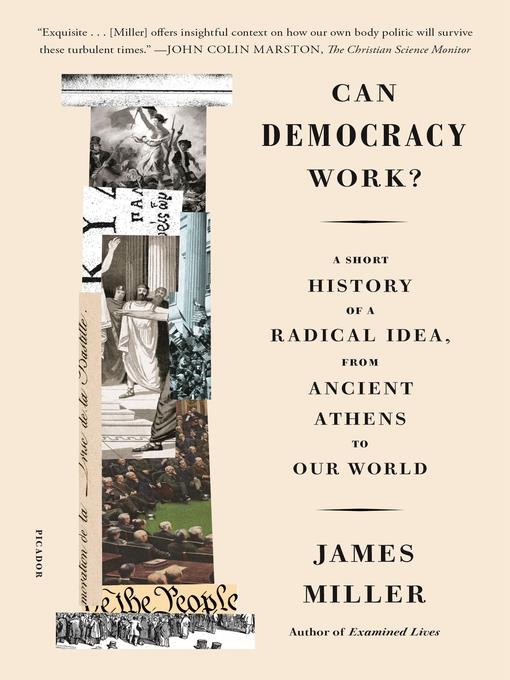
Can Democracy Work?
A Short History of a Radical Idea, from Ancient Athens to Our World
- اطلاعات
- نقد و بررسی
- دیدگاه کاربران
نقد و بررسی

June 15, 2018
The meaning of democracy has changed dramatically throughout history.With autocratic leaders emerging in so-called democratic nations, Miller (Political Science/New School; Eminent Lives: From Socrates to Nietzsche, 2011, etc.) investigates the slippery term "democracy" and the "inherently unstable" democratic project. "If both North Korea and the United States consider themselves democratic," writes the author, and if all manner of politicians claim "to embody the will of the people--then what, in practice, can the idea of democracy possibly mean?" In response to this vexing question, Miller offers an informative historical overview of democratic efforts, from ancient Greece to contemporary times, including revolutions in France (1792) and America (1776), 19th-century socialist uprisings in Europe, the early-20th-century revolution in Russia, and current populist movements. Although Athens has been acclaimed as the birthplace of democracy, the author counters that assumption: While a lottery system insured wide participation in government, women and slaves were excluded; moreover, throughout Greece, most cities were aristocracies or oligarchies. Many revolutions enacted to promote democracy--the French Revolution, the Paris Commune, and the British Chartist movement--ended in defeat and bloodshed, tainting the idea of democracy as ill-advised, creating "a new kind of tyranny, a collective tyranny of the majority" who were largely uninformed and easily swayed by inflammatory rhetoric. The term became "widely associated with the danger of mob rule" and anarchy. America's Founding Fathers did not think of themselves as democrats, believing "the election of representatives to be preferable to, and a necessary check on, the unruly excesses of a purely direct democracy." Not until the presidential campaign of 1800 did Thomas Jefferson bring the term democracy into political discourse, conflating its usage with "fealty to the Constitution." Miller is hopeful that even if democracy is threatened by political propagandists disseminating lies and creating confusion, democratic ideals and liberal principles will persist as long as democracy functions "as a shared faith."A revealing examination of the successes and perils of popular participation in government.
COPYRIGHT(2018) Kirkus Reviews, ALL RIGHTS RESERVED.

August 6, 2018
Government by the people—exercising power themselves without delegating it to representatives or administrators—remains a conflicted, elusive goal, according to this incisive study of direct democracy. Politics professor Miller (Examined Lives) explores examples of direct and participatory democracy: ancient Athens, where 60,000 citizens assembled regularly to vote on law, policy, and war, and random people were appointed to government offices by lottery; the French Revolution, when Parisian neighborhood assemblies overthrew the national legislature; the rise of America’s Jacksonian democracy, granting the vote to all white men; the Russian Revolution, when local soviets of workers and soldiers became a rival government; and Occupy Wall Street’s experiment in all-inclusive consensus decision-making. Drawing on political thought from Aristotle to Rousseau to Walter Lipmann, Miller cogently identifies both the strengths of direct democracy (challenging unresponsive representative government and propelling change) and its weaknesses: instability and violence, vulnerability to demagogues, the difficulty of telling what a divided people really want, the need for specialist legislators and bureaucrats in a complex modern society, and a legacy of “destructive and illiberal totalitarian democracy.” Miller’s engaging, thoughtful exploration of some of history’s most dramatic episodes illuminates the ongoing discontent with flawed systems of self-rule.

August 1, 2018
Miller (Examined Lives: From Socrates to Nietzsche) argues that a standard definition of democracy does not exist, as the word has been used to describe both representative political systems and dictatorships. He looks at several democratic systems and movements to determine their nature and effectiveness, starting with ancient Athens to the French, American, and Russian Revolutions and ending with governments of the present day. In each example, Miller considers the nature of public participation and the institutions that support the democracy. As Miller admits, the examples are Eurocentric and do not represent a comprehensive survey of democratic movements. Detailed background information is omitted by necessity, which could confuse readers less familiar with the historical events described. Miller also discusses prominent democratic and social theorists Karl Marx, Cleisthenes, Alexis de Tocqueville, and Samuel Huntington, and ends by speculating on improvements that would make democracy adhere closer to their ideals. VERDICT A thoughtful but sometimes dense exploration of Western democracy. Recommended for readers interested in political systems.--Rebekah Kati, Univ. of North Carolina, Chapel Hill
Copyright 2018 Library Journal, LLC Used with permission.

August 1, 2018
A professor of politics and liberal studies at the New School for Social Research, Miller wrote a key work about 1960s protests, Democracy Is in the Streets, among other acclaimed titles. Here he examines the often-embattled idea of democracy, starting with the ancient Greeks, who preferred lottery to elections, which they saw as innately corrupt and undemocratic; moving through history (he points out that French revolutionaries claimed they embodied the will of the people but eventually repudiated them); and arriving at Occupy Wall Street. Big promotion.
Copyright 2018 Library Journal, LLC Used with permission.




دیدگاه کاربران